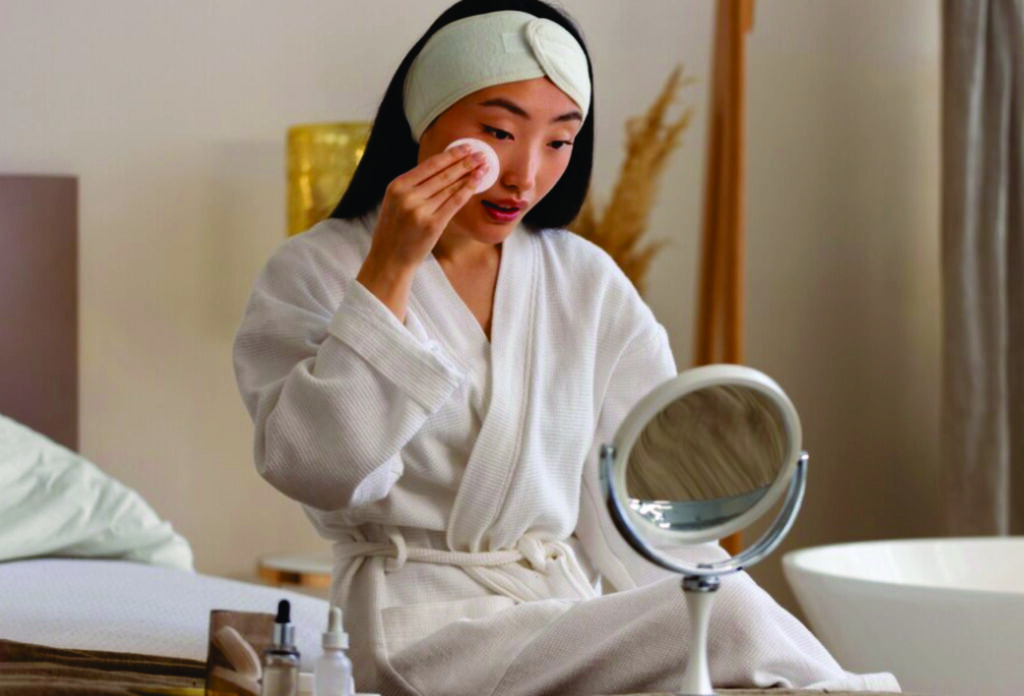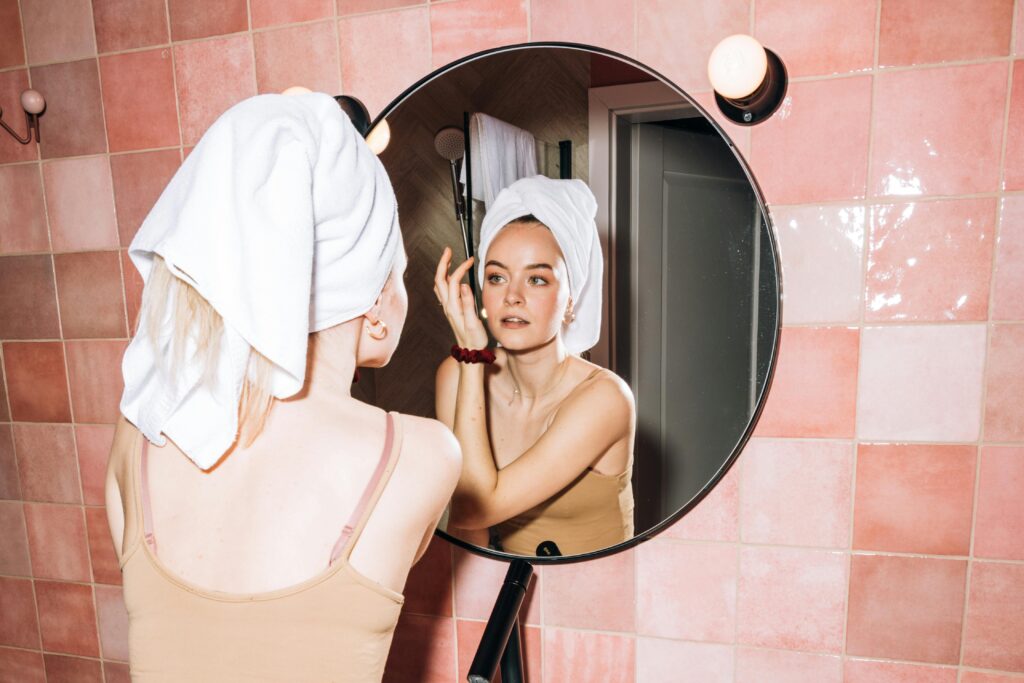A well-balanced vegan diet can support glowing skin and strong hair at every stage of life. Vegan nutrition for healthy skin depends on thoughtful food choices and long-term consistency. Plant-based nutrition requires awareness and planning. Skin and hair are sensitive to nutrient gaps. Even small deficiencies can show visible effects. The right food choices help prevent dryness, breakouts, and hair thinning.
Understanding how to balance nutrition for healthy skin and hair on a vegan diet is essential. Long-term beauty depends on consistency, not short-term fixes. With the right approach, a vegan lifestyle can fully support skin renewal and hair strength.

The Role of Nutrition in Skin and Hair Health
Skin and hair are not vital organs. When nutrients are limited, the body redirects them elsewhere. This is why nutritional imbalances often appear first on the skin or scalp. Hair may lose shine. and skin can become dull or irritated.
A vegan diet removes animal-based sources of protein, iron, zinc, and vitamin B12. These nutrients play a direct role in collagen formation and cell repair. Without proper substitutes, deficiencies may develop slowly and silently.
A well-planned plant-based diet can fully meet these needs. Variety is the key factor.
How a Vegan Diet Affects Skin and Hair
Plant-based diets are rich in antioxidants and fiber. These compounds support gut health and reduce inflammation. Healthy digestion improves nutrient absorption. This directly affects skin clarity and hair growth.
However, several nutrients require special attention. Protein quality matters. Mineral absorption can be lower from plant foods. Iron and zinc are common concerns.
On vegan forums, many users report skin changes during the first year. One Reddit user shared that her skin became dry after six months. Blood tests later showed low iron and zinc. After dietary adjustments, her skin texture improved within weeks.
These stories are common: they highlight the importance of proactive nutrition planning.
Essential Nutrients for Healthy Skin and Hair
Protein – The Building Block of Skin and Hair
Protein supports keratin production and skin structure. Hair strands are mostly protein. Low intake weakens hair shafts and slows growth.
Plant proteins vary in amino acid profiles. Combining sources improves results.
Vegan protein sources include:
- Lentils
- Chickpeas
- Tofu
- Tempeh
- Quinoa
- Nuts and seeds
A peer-reviewed review published in Nutrients highlights that adequate intake of key nutrients, including protein, plays an important role in normal hair follicle cycling and skin regeneration by supporting cellular turnover and tissue repair.
On vegan fitness forums, users often report stronger hair after increasing protein variety. Many note improvements after adding lentils and tempeh daily.
Omega-3 Fatty Acids for Hydrated Skin and Hair Growth
Omega-3 fats support the skin barrier. They reduce inflammation and scalp dryness. Low intake can worsen eczema and dandruff.
For individuals following a vegan diet, algal oil supplements provide a direct source of DHA and EPA without the use of fish-derived ingredients.
Vegan omega-3 sources include:
- Chia seeds
- Flaxseeds
- Walnuts
- Hemp seeds
- Algal oil
A review published in Nutrients reports that omega-3 polyunsaturated fatty acids play an important role in skin barrier function, inflammation control, and wound healing through their bioactive metabolites, supporting overall skin health.
Several vegan skincare forum users report calmer skin after adding ground flaxseed daily. Scalp itchiness also decreased.
Iron – Preventing Hair Thinning and Dull Skin
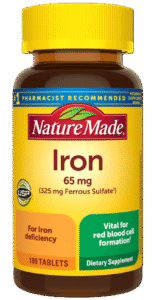
Iron carries oxygen to cells and plays a critical role in hair follicle activity. Low iron levels are commonly associated with increased hair shedding and dull skin tone. While plant-based diets provide non-heme iron, absorption can be lower compared to animal sources, making intake and pairing strategies especially important. In cases of confirmed deficiency or low ferritin levels, supplementation may be recommended under medical guidance. For example, Iron 65 mg Tablets (Ferrous Sulfate) from Nature Made are commonly used to support red blood cell formation. As with any iron supplement, dosage and suitability should be evaluated individually.
Non-heme iron absorbs less efficiently. Pairing with vitamin C improves uptake.
Vegan iron sources include:
- Spinach
- Lentils
- Pumpkin seeds
- Quinoa
- Fortified cereals
- Dark leafy greens
A clinical study published in a peer-reviewed dermatology journal found that low serum ferritin levels are commonly associated with female pattern hair loss and chronic telogen effluvium, even when hemoglobin levels remain within the normal range, highlighting iron deficiency as a contributing factor.
On women’s health forums, many vegans discovered low ferritin despite normal hemoglobin. Supplementation and food pairing restored hair density over time.
Zinc – For Clear Skin and Strong Hair Follicles
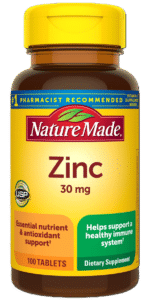
Zinc regulates oil production, supports wound healing, and plays a key role in immune defense and hair follicle recovery. Low zinc levels have been associated with increased acne severity and prolonged hair shedding. While many people obtain zinc through whole plant foods, supplementation may be considered when dietary intake is insufficient. For example, Zinc 30 mg Tablets from Nature Made are commonly used to help meet daily zinc requirements. As with any supplement, ingredient lists should be reviewed to ensure suitability for individual dietary preferences.
Vegan zinc sources include:
- Chickpeas
- Cashews
- Pumpkin seeds
- Whole grains
- Tofu
- Mushrooms
A peer-reviewed clinical review published in the Journal of Dermatological Treatment discusses zinc’s antioxidant and immunomodulatory roles in dermatological conditions such as acne and hair loss, and reports evidence supporting the use of zinc in individuals with zinc deficiency.
Forum users often describe stubborn acne improving after increasing zinc-rich foods. Many avoid supplements and focus on seeds instead.
Vitamin B12 – Essential for Skin and Hair Regeneration
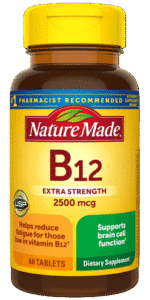
Since vitamin B12 is not naturally present in plant foods, supplementation is essential for most vegans. Prolonged deficiency may lead to dry skin, dull complexion, brittle nails, and increased hair shedding. In cases of low or borderline levels, higher-dose supplements are sometimes recommended under professional guidance. For example, Vitamin B12 Extra Strength 2500 mcg Tablets from Nature Made are formulated to support cellular energy production and nervous system function, both of which play an important role in maintaining healthy skin tone and hair quality. As with any supplement, ingredient lists should be reviewed to ensure alignment with individual dietary preferences.
Reliable vegan B12 sources include:
- Fortified plant-based milk
- Nutritional yeast
- Fortified cereals
- Vegan B12 supplements
A systematic review and meta-analysis found that people following a vegan diet tend to have lower vitamin B12 intake and status, and that supplementation is important to help maintain adequate B12 levels compared with omnivores and vegetarians.
Many long-term vegans on health forums stress that consistent B12 intake improved energy, hair texture, and skin tone.
How to Ensure a Balanced Vegan Diet for Skin and Hair
Diversify Your Meals
Diet variety helps prevent hidden micronutrient gaps. Each plant food provides a unique combination of vitamins, minerals, and antioxidants. Rotating grains, legumes, vegetables, and seeds improves overall nutrient coverage.
Eating the same foods daily increases the risk of deficiencies over time. Even healthy foods cannot supply everything alone. Color diversity is also important. Different pigments often indicate different phytonutrients that support skin repair and cellular protection.
Many long-term vegans on nutrition forums note improvements in skin tone after expanding their food choices. Simple changes, such as alternating legumes or adding seasonal vegetables, often make a visible difference.
Include Healthy Fats
Healthy fats protect the skin barrier and prevent moisture loss. They support elasticity and reduce irritation. Hair follicles also depend on proper lipid balance to remain strong and resilient.
Plant-based fats help transport fat-soluble vitamins. These include vitamins A, D, E, and K. Without enough dietary fat, absorption may decrease.
Include avocado, olive oil, nuts, and seeds daily. Small portions are sufficient. Avoid extreme fat restriction, as it often leads to dry skin and brittle hair over time.
Stay Hydrated
Water plays a key role in nutrient transport and cellular renewal. Dehydration reduces skin elasticity and makes hair strands more fragile. Chronic low hydration often shows as dullness rather than dryness.
Proper hydration also supports digestion. Efficient digestion improves nutrient absorption and gut balance. This indirectly affects skin clarity and scalp health.
Drink water consistently throughout the day. Include water-rich foods such as cucumbers, berries, citrus fruits, and leafy greens. These foods support hydration while providing antioxidants.
Plan Your Nutrient Intake
Tracking nutrient intake increases awareness and consistency. It helps identify gaps before symptoms appear. This approach reduces long-term risks associated with vegan deficiencies.
Many vegans use tracking apps to monitor protein, iron, zinc, and vitamin B12. Periodic blood tests provide objective feedback and peace of mind.
Consulting a nutritionist can be beneficial. This is especially important during pregnancy, breastfeeding, intense physical activity, or periods of stress. Proper planning supports both health and confidence in a plant-based lifestyle.
Skincare and Haircare Tips for Vegans
Vegan Skincare Routine
- Cleanse gently with plant-based formulas
- Moisturize with jojoba or rosehip oil
- Exfoliate weekly
- Use SPF daily
- Eat antioxidant-rich foods
Topical care supports internal nutrition. Both work together.
Vegan Haircare Tips
- Choose sulfate-free shampoos
- Oil the scalp weekly
- Massage gently to improve circulation
- Trim regularly
- Limit heat styling
Several vegan beauty forum users report better results after reducing product overload. Simpler routines improved scalp health.
Final Thoughts
Balancing nutrition for healthy skin and hair on a vegan diet requires attention and consistency. Protein, iron, zinc, omega-3 fats, and vitamin B12 are essential. Each plays a specific role in skin renewal and hair growth.
A well-planned vegan diet can fully support beauty and wellness. Real-life experiences confirm this. Scientific research supports it. Nutrition and care work best together. Hydration and diversity matter daily.
For more evidence-based guidance, visit The Vegan Society.
This article is for informational purposes only and does not replace medical advice.
Always consult a qualified healthcare professional before starting supplements.
Reviewed using peer-reviewed scientific sources and nutrition guidelines.
Why Natural Ingredients Work Better for Skincare

I’m Victoria, the creator behind Eva My Balance. Passionate about beauty, wellness, sustainable living, and mindful self-care. My mission is to inspire you to live consciously and beautifully—inside and out.

